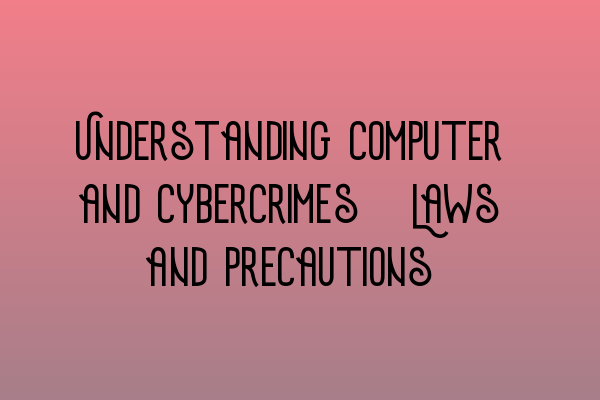Understanding Computer and Cybercrimes: Laws and Precautions
In the digital age, computer and cybercrimes have become increasingly prevalent. Criminal activities conducted through computer systems and the internet can have severe consequences for both individuals and businesses. It is crucial to understand the laws surrounding these crimes and take necessary precautions to protect yourself and your organization.
When it comes to understanding computer and cybercrimes, there are several key points to consider:
1. Definition and Types of Computer and Cybercrimes
Computer and cybercrimes refer to illegal activities that are committed using computer systems or the internet. These crimes can be broadly categorized into:
- Hacking and unauthorized access
- Identity theft and fraud
- Distribution of malware and viruses
- Online harassment and stalking
- Online scams and phishing
- Data breaches and theft
Each type of crime carries its own legal implications and penalties, making it essential to have a solid understanding of the specific laws that govern these activities.
2. Laws and Regulations
The UK has implemented various laws and regulations to combat computer and cybercrimes. The Computer Misuse Act 1990 is the primary legislation that addresses offenses related to unauthorized access, hacking, and the distribution of malicious software. This act outlines the penalties and consequences for individuals involved in these activities.
Additionally, other legislation such as the Data Protection Act 2018 and the General Data Protection Regulation (GDPR) play a vital role in safeguarding personal and sensitive data from unauthorized access and misuse. These regulations impose strict obligations on organizations to protect their customers’ data.
It is essential for individuals and businesses to familiarize themselves with these laws and ensure compliance to avoid legal repercussions.
3. Precautions and Best Practices
While legal measures are in place, it is equally important to take proactive precautions to protect against computer and cybercrimes. Here are some best practices:
- Implement robust security measures, such as firewalls and antivirus software, to safeguard computer systems and networks.
- Regularly update software and operating systems to ensure they have the latest security patches.
- Create strong and unique passwords for all online accounts, and consider implementing multi-factor authentication for added security.
- Exercise caution when clicking on links or downloading attachments from unknown sources.
- Ensure employees receive proper cybersecurity training and education to recognize potential threats and respond appropriately.
- Backup important data regularly and store it securely to mitigate the risks of data loss.
By following these precautions and adopting good cybersecurity practices, individuals and businesses can significantly reduce their vulnerability to computer and cybercrimes.
Conclusion
Computer and cybercrimes pose significant threats in today’s digital landscape. Understanding the laws and regulations surrounding these crimes and implementing precautionary measures are essential for personal and organizational safety. By staying informed, taking necessary precautions, and seeking legal guidance when needed, individuals and businesses can navigate the digital world with confidence.
For more information on legal representation for Delaware LLCs in the UK, ensuring ethical business practices, and related legal challenges for UK businesses, please refer to the following articles:
- Legal Representation for Delaware LLCs in the UK: Expert Advice
- Ensuring Ethical Business Practices: Delaware’s Code of Conduct
- Legal Challenges for UK Businesses in the U.S.: Strategies for Overcoming Hurdles
- UK Criminal Law: An In-Depth Analysis of the British Legal System
- Legal Challenges for UK Businesses in the U.S.: Strategies for Overcoming Hurdles
